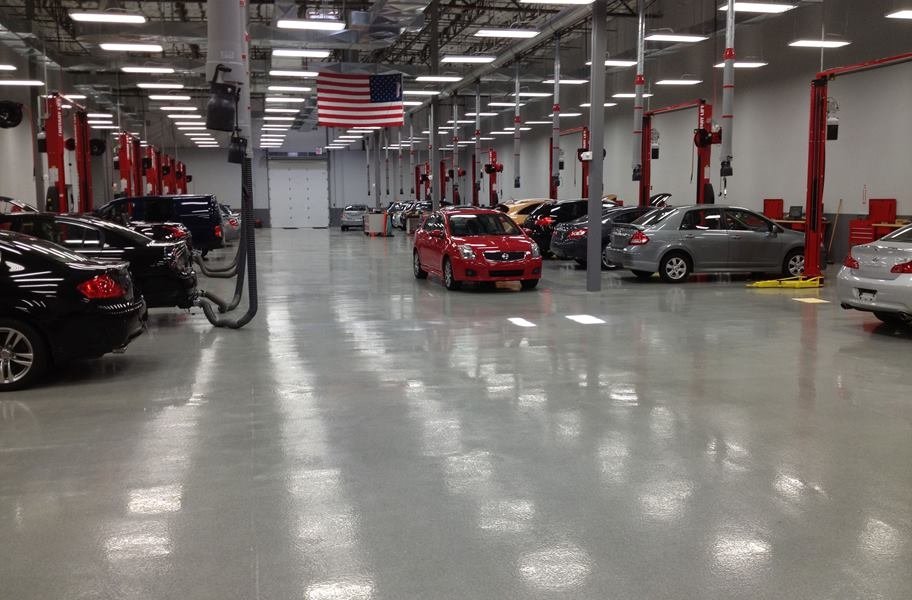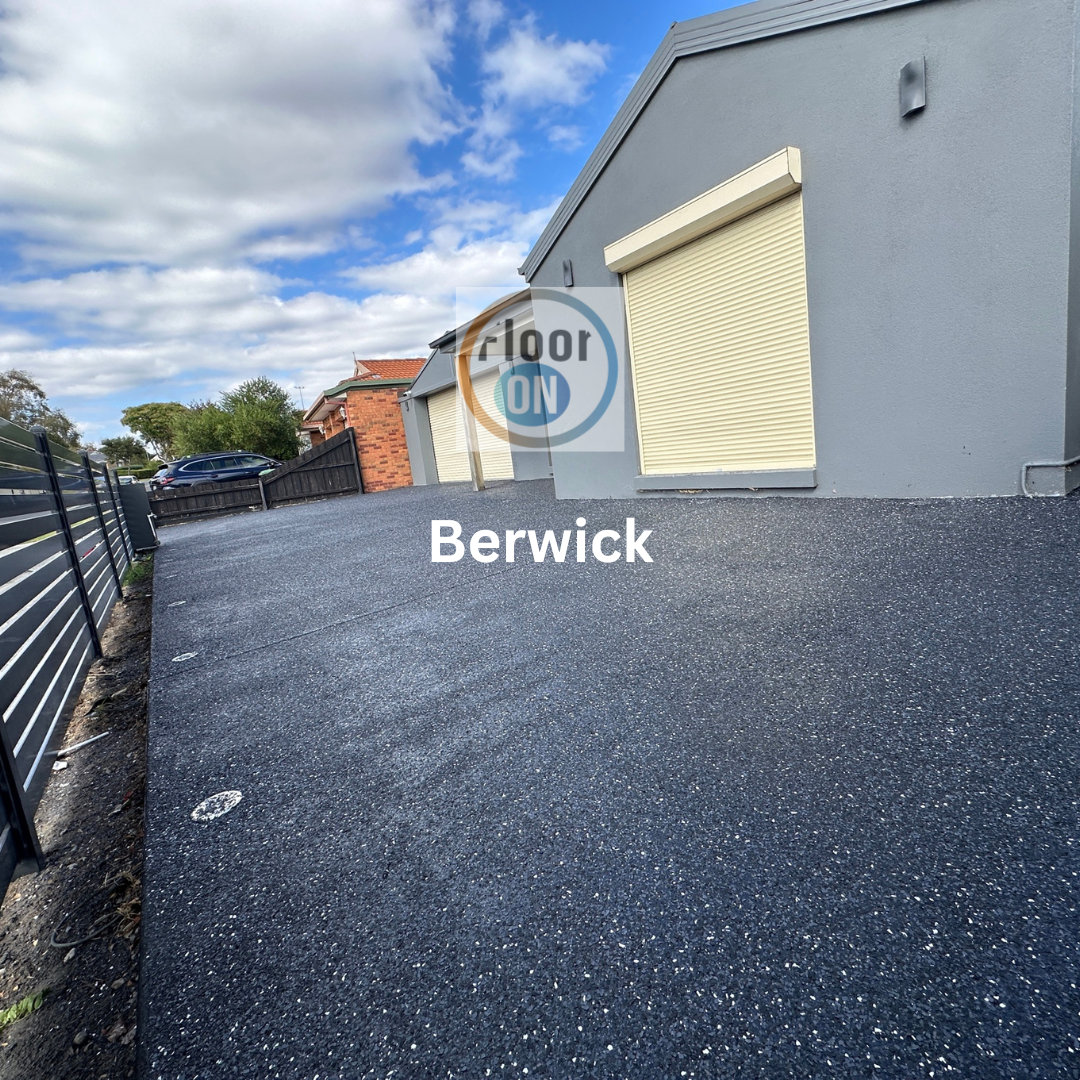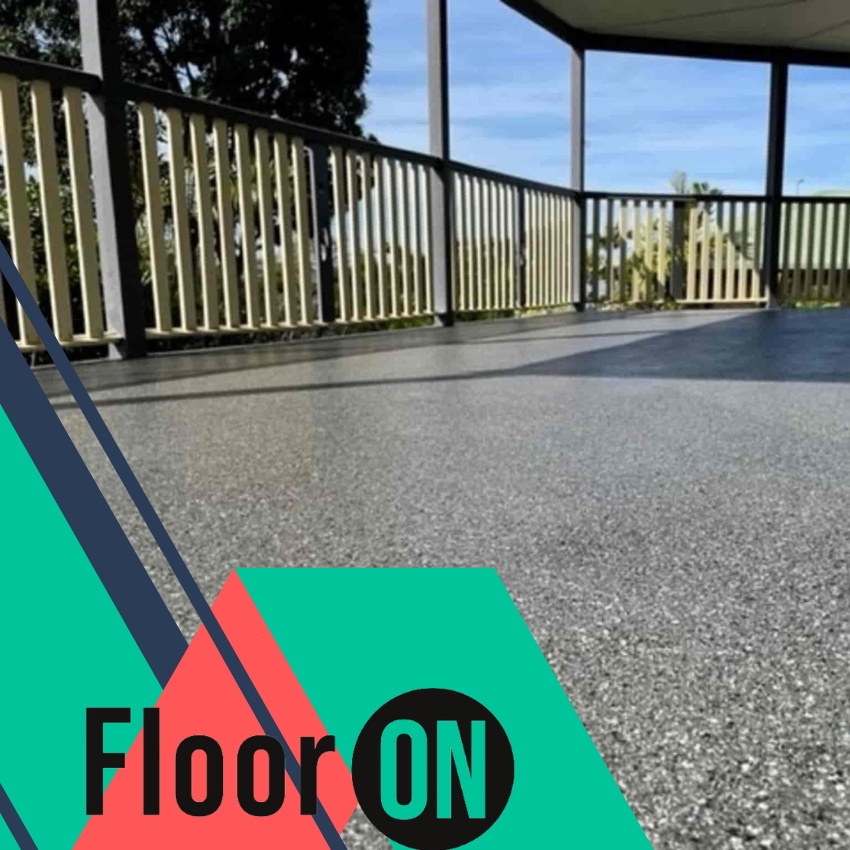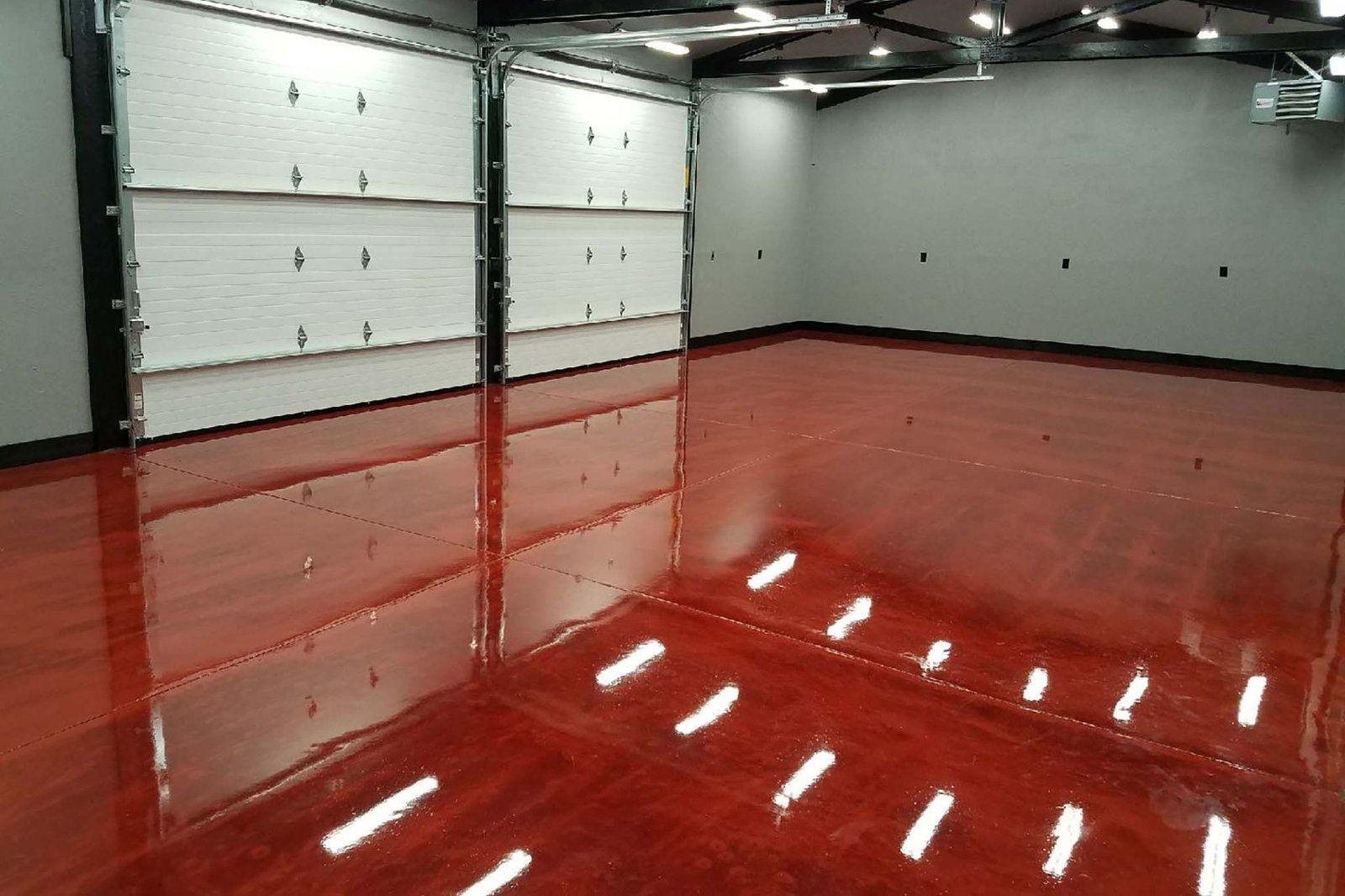Epoxy floor coatings are becoming increasingly popular in the industrial sector due to their durability, cost-effectiveness, and versatility. In this article, we will explore the benefits of using epoxy floor coatings for industrial facilities and how they can improve safety, productivity, and aesthetics.
Table of Contents
- Introduction
- What is Epoxy Floor Coating?
- Benefits of Epoxy Floor Coatings for Industrial Facilities
- Durability
- Chemical Resistance
- Slip Resistance
- Low Maintenance
- Aesthetics
- Cost-Effective
- Quick Installation
- Eco-Friendly
- Types of Epoxy Floor Coatings
- Factors to Consider Before Installing Epoxy Floor Coatings
- How to Install Epoxy Floor Coatings in Industrial Facilities
- Cleaning and Maintenance of Epoxy Floor Coatings
- Common Applications of Epoxy Floor Coatings in Industrial Facilities
- Safety Measures When Installing Epoxy Floor Coatings
- FAQs
- Conclusion
What is Epoxy Floor Coating?
Epoxy floor coating is a type of flooring material made from a combination of resin and hardeners. It is a popular choice for industrial facilities because of its ability to withstand heavy foot traffic, chemicals, and other harsh elements. Epoxy coatings create a seamless and durable surface that can last for many years without cracking or chipping.
Benefits of Epoxy Floor Coatings for Industrial Facilities
Durability
One of the primary benefits of using epoxy floor coatings in industrial facilities is their durability. Epoxy coatings can withstand heavy equipment, foot traffic, and other harsh conditions without cracking or chipping. They also have excellent resistance to chemicals, which makes them ideal for facilities that deal with hazardous materials.
Chemical Resistance
Epoxy floor coatings have excellent resistance to chemicals, making them ideal for use in industrial facilities that deal with hazardous materials. They can withstand exposure to acids, solvents, and other chemicals without deteriorating or losing their strength.
Slip Resistance
Epoxy floor coatings can be formulated to provide slip resistance, which is important in industrial facilities where spills and wet floors are common. Slip-resistant epoxy coatings can help prevent slips, falls, and other accidents, reducing the risk of injury in the workplace.
Low Maintenance
Epoxy floor coatings are easy to maintain and require little upkeep. They are resistant to stains, dirt, and debris, which makes them easy to clean. A simple sweep and mop can keep an epoxy-coated floor looking clean and new for many years.
Aesthetics
Epoxy floor coatings come in a variety of colors and finishes, making them ideal for facilities that want to create a specific look or aesthetic. They can be customized to match a facility’s branding, create a unique design, or enhance the overall look and feel of the space.
Cost-Effective
Epoxy floor coatings are a cost-effective flooring option for industrial facilities. They are less expensive than many other flooring materials, such as tile or carpet, and can last for many years without needing to be replaced. They also require little maintenance, which can help reduce long-term costs.
Quick Installation
Epoxy floor coatings can be installed quickly and easily, minimizing downtime for industrial facilities. Most installations can be completed in a matter of days, which means that facilities can resume operations quickly without significant disruption.
Eco-Friendly
Epoxy floor coatings are a more environmentally friendly flooring option than many other materials. They produce less waste during installation, require fewer resources to maintain, and can be recycled at the end of their lifespan.
There are several types of epoxy floor coatings available for industrial facilities, each with its own specific properties and uses. Some common types include:
- Self-Leveling Epoxy Coatings: These coatings are highly fluid and self-leveling, which helps to create a smooth and seamless surface. They are often used to repair damaged floors or provide a high-gloss finish.
- Mortar Epoxy Coatings: This type of epoxy coating is a combination of epoxy resin and graded aggregates, such as quartz or sand. It creates a thicker and more durable surface that can withstand heavy impacts and thermal shock.
- Antistatic Epoxy Coatings: These coatings are specially formulated to dissipate static electricity, making them ideal for industrial facilities that deal with sensitive electronic equipment or materials.
- Decorative Epoxy Coatings: These coatings are designed to enhance the aesthetics of a space. They can be customized with various colors, patterns, and textures to create a visually appealing floor.
- UV-Resistant Epoxy Coatings: UV-resistant epoxy coatings are used in facilities with exposure to sunlight or ultraviolet radiation. They prevent discoloration and degradation caused by UV rays, ensuring the longevity of the floor.
Factors to Consider Before Installing Epoxy Floor Coatings
Before installing epoxy floor coatings in an industrial facility, there are several factors that need to be considered:
- Surface Preparation: Proper surface preparation is essential for the successful installation of epoxy floor coatings. The surface needs to be clean, dry, and free from any contaminants or existing coatings.
- Traffic and Usage: Consider the level of foot and vehicle traffic in the facility and choose an epoxy coating that can withstand the expected usage. For high-traffic areas, a thicker and more durable coating may be required.
- Chemical Exposure: Identify the types of chemicals or substances that the floor may come into contact with. Choose an epoxy coating that has excellent chemical resistance to ensure it can withstand the specific chemicals used in the facility.
- Temperature and Environment: Take into account the temperature and environmental conditions of the facility. Some epoxy coatings are better suited for extreme temperatures, humidity, or exposure to moisture.
- Desired Aesthetics: Consider the desired look and feel of the floor. Decide on the color, finish, and design options that will best suit the facility’s branding or aesthetic requirements.
How to Install Epoxy Floor Coatings in Industrial Facilities
The installation process for epoxy floor coatings in industrial facilities typically involves the following steps:
- Surface Preparation: The floor surface is thoroughly cleaned to remove any dirt, grease, or contaminants. Any cracks or damages are repaired, and the surface is properly etched or mechanically abraded to ensure good adhesion.
- Primer Application: A primer is applied to the prepared surface to enhance adhesion and create a bond between the substrate and the epoxy coating.
- Epoxy Application: The epoxy coating is mixed according to the manufacturer’s instructions and applied to the primed surface using a roller or a squeegee. Multiple coats may be necessary to achieve the desired thickness.
- Curing: The epoxy coating needs to cure for a specific period to achieve its full strength and durability. This curing time can vary depending on the product used and environmental conditions.
- Topcoat Application (Optional): For added protection and aesthetics, a clear topcoat can be applied over the cured epoxy coating. The topcoat provides additional durability, chemical resistance, and a glossy finish.
Cleaning and Maintenance of Epoxy Floor Coatings
- Regular Cleaning: Sweep or vacuum the floor to remove loose dirt and debris. Use a mild detergent and warm water to mop the surface regularly. Avoid using abrasive cleaners or harsh chemicals that can damage the epoxy coating.
- Prompt Spill Cleanup: Clean up spills immediately to prevent staining or damage to the epoxy coating. Use absorbent materials such as towels or dry cloths to blot and remove the spilled substance. If needed, gently scrub the area with a soft brush and mild detergent.
- Avoid Heavy Abrasion: While epoxy floor coatings are durable, excessive abrasion from heavy machinery or sharp objects can cause damage. Use floor protectors on equipment and avoid dragging heavy objects across the floor.
- Regular Inspections: Conduct regular inspections of the epoxy floor coating to identify any signs of wear, cracks, or damage. Address any issues promptly to prevent further deterioration.
- Periodic Maintenance: Depending on the specific epoxy coating used, periodic maintenance may be required. This can include reapplication of a topcoat or touch-up of any damaged areas. Follow the manufacturer’s guidelines for maintenance recommendations.
Common Applications of Epoxy Floor Coatings in Industrial Facilities
Epoxy floor coatings have a wide range of applications in industrial facilities. Some common areas where epoxy coatings are used include:
- Warehouses and Distribution Centers: Epoxy floor coatings are ideal for warehouses and distribution centers due to their durability and resistance to heavy foot and vehicle traffic. They provide a seamless and easy-to-clean surface, enhancing safety and productivity.
- Manufacturing Facilities: Epoxy coatings are frequently used in manufacturing facilities where chemical spills, impacts, and heavy machinery are common. They provide a reliable and long-lasting surface that can withstand the demands of the manufacturing environment.
- Food and Beverage Processing Plants: Epoxy floor coatings are highly suitable for food and beverage processing plants due to their resistance to stains, chemicals, and bacteria growth. They create a hygienic and easy-to-clean surface that complies with industry regulations.
- Laboratories and Clean Rooms: Epoxy coatings are used in laboratories and clean rooms to provide a seamless, dust-free, and chemical-resistant surface. They create a sterile environment that is essential for research, testing, and manufacturing processes.
- Automotive and Aerospace Facilities: Epoxy floor coatings are commonly used in automotive and aerospace facilities due to their ability to withstand oil, chemicals, and heavy vehicle traffic. They provide a durable and attractive surface that can handle the unique requirements of these industries.
Safety Measures When Installing Epoxy Floor Coatings
While epoxy floor coatings offer numerous benefits, it’s important to prioritize safety during installation. Consider the following safety measures:
- Ventilation: Ensure proper ventilation in the area during the installation process to minimize exposure to fumes emitted by the epoxy coating and any associated chemicals.
- Personal Protective Equipment (PPE): Wear appropriate PPE, including gloves, safety goggles, and a respirator, to protect against contact with the epoxy coating and fumes.
- Safety Signage: Display clear signage to alert personnel and visitors about the ongoing floor coating installation. Restrict access to the area until the coating has fully cured.
- Follow Manufacturer’s Instructions: Adhere to the manufacturer’s instructions and guidelines for handling, mixing, and applying the epoxy coating to ensure a safe installation process.
- Consult Professionals: If you’re unsure about the installation process or lack experience, consider hiring professionals who specialize in epoxy floor coating installations. They have the expertise and equipment to ensure a safe and successful installation.
Conclusion
Epoxy floor coatings offer numerous benefits for industrial facilities, including durability, chemical resistance, slip resistance, low maintenance, aesthetics, cost-effectiveness, quick installation, and eco-friendliness. They provide a reliable and long-lasting flooring solution that can withstand the demands of industrial environments.
By choosing epoxy floor coatings, industrial facility owners can enhance safety, improve productivity, and create a visually appealing workspace. The seamless and easy-to-clean surface of epoxy coatings contributes to a cleaner and more hygienic environment, making them suitable for industries such as manufacturing, warehousing, food processing, and laboratories.
Proper installation, regular cleaning, and maintenance are essential for maximizing the lifespan and performance of epoxy floor coatings. Following safety measures during installation and adhering to manufacturer’s guidelines can ensure a safe and successful application.
If you’re considering epoxy floor coatings for your industrial facility, consult with professionals who have expertise in the field. They can guide you in choosing the right type of epoxy coating for your specific needs and ensure a proper installation that meets industry standards.
Unlock the benefits of epoxy floor coatings for your industrial facility and enjoy a durable, cost-effective, and visually appealing flooring solution.
FAQs
- How long does it take for epoxy floor coatings to cure? The curing time of epoxy floor coatings can vary depending on factors such as temperature, humidity, and the specific product used. Generally, it takes around 24 to 72 hours for epoxy coatings to cure completely.
- Can epoxy floor coatings be applied to uneven surfaces? Epoxy floor coatings can be applied to uneven surfaces, but proper surface preparation is essential. The surface needs to be properly cleaned, repaired, and leveled before applying the epoxy coating for best results.
- Are epoxy floor coatings suitable for outdoor use? Some epoxy floor coatings are specifically formulated for outdoor use and can withstand UV exposure and weather conditions. However, not all epoxy coatings are suitable for outdoor applications, so it’s important to choose the right product based on your specific requirements.
- Can epoxy floor coatings be applied over existing flooring materials? In many cases, epoxy floor coatings can be applied over existing flooring materials such as concrete, provided that the surface is properly prepared. However, it’s important to assess the condition and compatibility of the existing flooring before applying the epoxy coating.
- How long do epoxy floor coatings last? When properly installed and maintained, epoxy floor coatings can last for many years, typically ranging from 10 to 20 years. Regular cleaning, maintenance, and periodic touch-ups can help prolong the lifespan of the coating.
For more information and guidance on epoxy floor coatings and other related topics, schedule a call today.






